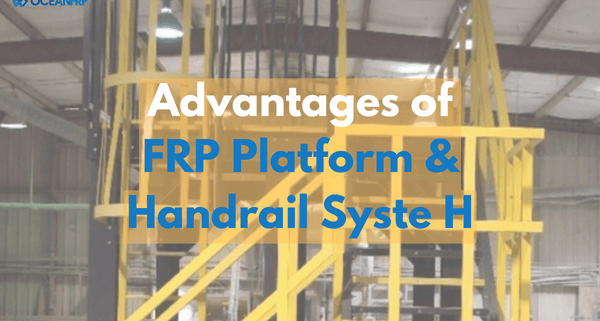Advantages of FRP Platform and Handrail Systems
Fiberglass-reinforced plastic (FRP) platforms and handrail systems are innovatively transforming the industrial landscape. These systems are designed to provide safe, long-lasting, and cost-effective solutions for various applications. Their unique properties make them superior to conventional materials like steel or wood, particularly in challenging environments where durability and safety are paramount.
Employing the advanced technology of composites, FRP platforms, and handrails offers various benefits that address modern industries’ practical and economic demands. They are widely recognized for their strength, corrosion resistance, and ease of maintenance, making them an attractive choice for businesses aiming to reduce long-term costs and enhance operational efficiency. In this post, we will discuss how the FRP platform and handrail systems can benefit industrial sites and construction projects.
FRP Platform and Handrail Systems Overview
FRP platform and handrail systems are comprehensive solutions composed of fiberglass grating and structural components specifically engineered for safety and performance. These systems are renowned for their corrosion-resistant qualities and are often preferred in harsh environments where traditional materials fail. FRP grating’s versatility allows for creating custom FRP configurations tailored to the specific needs of any project.
Thanks to the lightweight nature of FRP, these systems offer significant advantages over the weight of steel or other heavy materials. They exhibit excellent strength and resistance against environmental stressors, positioning them as the ideal choice for industrial applications that demand resilience and long-term reliability.
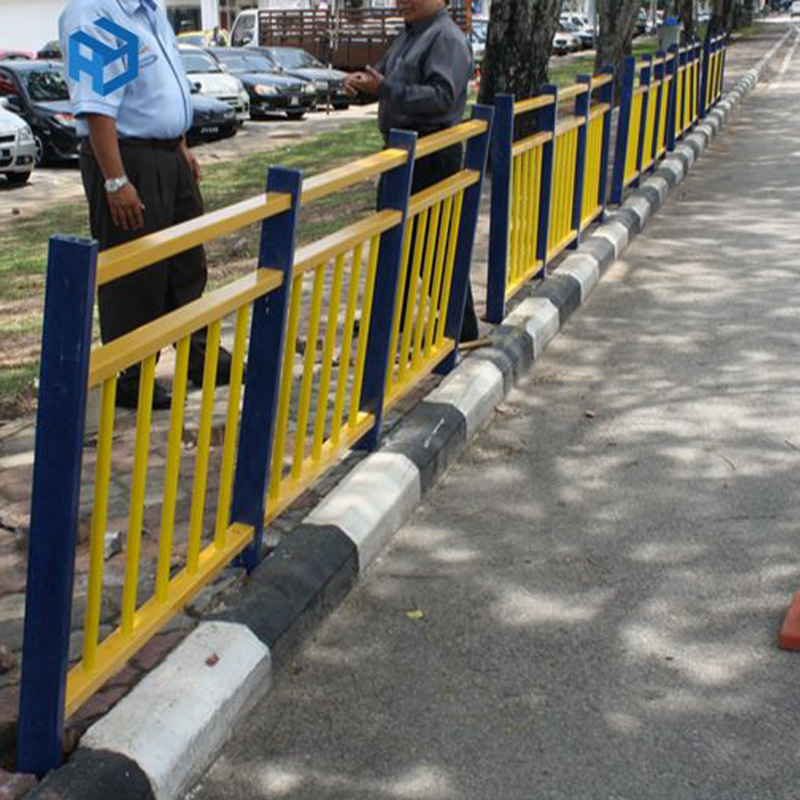
BUY PLATFORM AND HANDRAIL SYSTEMS HERE
FRP Grating Platform and Handrail Specifications
Specifications of FRP grating platform and handrail systems prioritize performance and safety. Manufactured to withstand heavy loads; the fiberglass material ensures a durable platform that maintains its integrity over time. The specifications cater to various industrial standards, ensuring that each component, from the grating to the handrails, delivers optimal functionality and addresses electrical conductivity concerns.
Material
Fiberglass Reinforced Plastic (FRP) is a durable and versatile plastic composite that is the foundational material for FRP platforms and handrail systems. Unlike metal handrails, FRP resists corrosion, requires minimal upkeep, and withstands the rigors of industrial use, providing a reliable alternative with many benefits.
Square Handrail
FRP square handrails are constructed using FRP square tubes and various-size fittings to ensure a secure and robust industrial handrail system. Designed to meet stringent safety standards, these handrails offer a dependable option for facilities requiring sturdy, maintenance-free barrier protection.
Round Handrail
The round handrail variant utilizes FRP round tubes and different size fittings, providing a smooth and ergonomic grip. This design is aesthetically pleasing and functional, offering a comfortable and secure handhold for users navigating elevated walkways and platforms.
Certification
FRP platform and handrail systems are manufactured in compliance with the ISO 9001 International Standard Quality System, ensuring consistent quality across all products. Additionally, they are ASTM E-84 compliant, adhering to fire safety standards that contribute to the overall safety of the installation.
Available Sizes
Customizability is a significant advantage of FRP systems, with available sizes tailored to fit specific project requirements. This flexibility ensures that each installation is optimized for its intended application, providing a precise fit that enhances the stability and functionality of the structure.
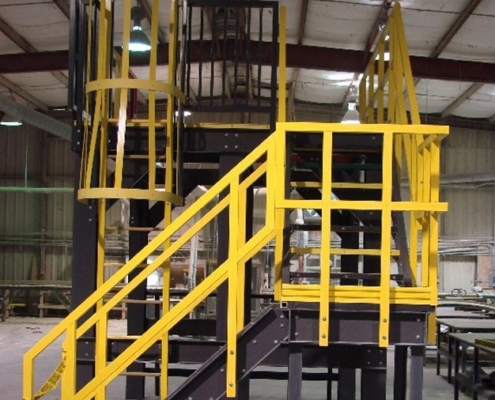
BUY PLATFORM AND HANDRAIL SYSTEMS HERE
Advantages of FRP Platform and Handrail Systems
FRP platform and handrail systems offer numerous benefits, including their corrosion-resistant and non-conductive properties, which make them ideal for industrial applications. The lightweight nature of FRP molded grating simplifies the installation process and saves costs associated with transportation and labor. The minimal maintenance requirements and corrosion-resistant properties also ensure a long-lasting solution, even in harsh environments. Fiberglass handrail systems are easily adaptable to field fabrication, aligning with OSHA standards and reducing the need for costly on-site adjustments.
UV and Corrosion Resistance
FRP systems are inherently corrosion resistant, making them well-suited for crossover platforms and industrial areas exposed to corrosive substances. The protective resin matrix that covers the fiberglass material prevents deterioration from UV radiation and harsh chemicals, preserving its structural integrity and appearance over time.
Compared to traditional options like steel, FRP pultrusion grating requires less frequent replacement or repair. It offers a cost-effective solution that maintains its integrity without succumbing to the elements. These attributes ensure that FRP remains preferred for long-term installations in demanding environments.
Lightweight and High Strength
FRP railing systems’ lightweight yet robust construction presents a distinct advantage during installation and use. The pultruded grating components offer high strength without the additional weight, making them easier to maneuver and install without compromising load-bearing capacity.
This combination of lightness and strength reduces installation costs and structural support requirements, as FRP pultruded profile can achieve comparable or superior performance to heavier materials with less material usage. As a result, FRP systems are an efficient and practical choice for many construction and safety applications.
Durability and Long Lifespan
FRP platforms and handrails are engineered for longevity, withstanding the test of time and persistent use. FRP’s resilience to environmental factors ensures a service life that often outlasts traditional materials, providing a significant return on investment.
FRP’s durability lies not only in its ability to resist wear but also in its capacity to maintain its structural properties under continuous load and variable conditions. Its resistance to corrosion, impact, and fatigue contributes to a long lifespan, making it a wise choice for any application requiring sustained performance.
Ease of Installation
One of the standout features of the FRP platform and handrail systems is their ease of installation. The materials can be prefabricated and assembled on-site with standard tools, reducing the need for specialized labor and heavy equipment. This streamlined process of FRP fitting diminishes project timelines and lessens disruptions to operations.
Moreover, the corrosion-resistant nature of FRP eliminates the need for protective coatings or sealants that other materials may require, further simplifying the installation process. This turnkey solution is quicker to implement and reduces the overall complexity of construction projects.
Low Maintenance
FRP platforms and handrails are synonymous with low maintenance. Their resistance to corrosion and environmental degradation requires less frequent inspections, cleanings, and repairs than traditional materials. The inherent durability of FRP reduces the need for ongoing maintenance, contributing to a lower total cost of ownership.
Additionally, the color of FRP is integrated throughout the material, eliminating the need for painting and ensuring that the appearance remains consistent over time. This feature and the material’s resistance to scratches and abrasions keep maintenance efforts to a minimum.
Non-Conductive Properties
One of the critical features of FRP platforms and handrails is their non-conductive properties. This characteristic is especially beneficial in environments with a risk of electrical conductivity. The insulating nature of FRP ensures that it does not conduct electricity, providing an additional safety measure for workers and equipment.
These non-conductive properties also make FRP an ideal choice for applications in the electrical and telecommunications industries, where avoiding interference with signal transmission is crucial. The use of FRP in these sectors can help mitigate risks and ensure the integrity of sensitive systems.
Customization and Design Flexibility
Fiberglass handrails and FRP grating platforms offer exceptional customization and design flexibility to meet diverse application needs. From custom handrail systems tailored to specific environmental conditions to structural shapes designed for unique load capacity requirements, FRP provides solutions that traditional materials cannot match. Incorporating UV inhibitors and synthetic surfacing in the fabrication process enhances the aesthetic appeal while maintaining functionality.
Cost-Effectiveness
While initial investment in FRP platform and handrail systems might be perceived as higher than traditional materials, their long-term cost-effectiveness is undeniable. Systems are lightweight, which reduces the need for heavy lifting equipment during installation, translating to lower labor costs. The light weight of FRP also contributes to lower transportation expenses. Additionally, the longevity of FRP, attributed to its resistance to corrosion and UV damage due to a robust UV coating, minimizes the need for replacement.
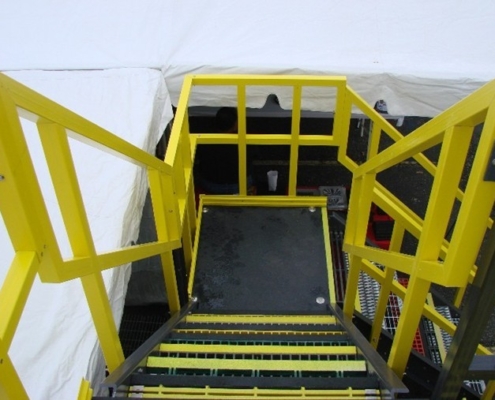
BUY PLATFORM AND HANDRAIL SYSTEMS HERE
Applications of FRP Platform and Handrail Systems
FRP platforms and handrails are employed in various sectors and have many applications. Industrial facilities benefit from the non-conductive properties and high corrosion resistance, while recreational and public areas appreciate the aesthetic options and safety features. Marine and offshore structures find UV and corrosion resistance indispensable, and chemical processing plants value chemical inertness. Power generation plants utilize FRP for its non-conductive and fire-retardant properties, and walkways and staircases in all these environments are safer with the slip-resistant surface of FRP grating.
Industrial Facilities
Fiberglass-reinforced polymer (FRP) systems offer significant benefits for industrial facilities. Their non-conductive properties ensure that FRP handrails do not conduct electricity, enhancing worker safety. The lightweight nature of FRP makes it easy to handle and install without compromising strength or load capacity. These systems are also fire retardant, with a flame spread rating by ASTM E-84, making them OSHA-compliant and suitable for use in environments where fire safety is paramount. The advantages of FRP in these settings are further underscored by their resistance to corrosive substances and extreme temperatures.
Recreational and Public Areas
FRP platforms and handrails are increasingly popular in recreational and public areas due to their aesthetic versatility and safety features. The material’s resistance to environmental degradation ensures that these installations retain their appearance and structural integrity over time, even in outdoor settings. The availability of various colors and textures allows for creating appealing environments, while the inherent safety characteristics, such as slip resistance and the absence of sharp edges, make FRP ideal for high-traffic public spaces.
Marine and Offshore Structures
FRP stands out in marine and offshore environments for its exceptional resistance to saltwater corrosion and marine organisms. Platforms and walkways constructed with FRP grating and handrails endure harsh marine conditions while requiring minimal maintenance. The lightweight yet durable nature of FRP makes it an optimal choice for structures that demand resilience against the relentless wear and tear of the sea. Additionally, the ease with which FRP can be installed on ships and offshore platforms reduces downtime and increases operational efficiency.
Chemical Processing Plants
Chemical processing plants require materials that can withstand aggressive chemicals and extreme temperatures. FRP grating and handrail systems excel in these environments due to their chemical inertness and thermal stability. Unlike metal stair and handrail systems that can rust over time, FRP maintains its integrity, ensuring continued safe operation. The combination of resistance to chemical exposure and the absence of a need for frequent replacements or repairs makes FRP a cost-efficient solution for these demanding industrial settings.
Power Generation Plants
FRP’s non-conductive properties are particularly beneficial in power generation plants, where electrical insulation is crucial for safety. The material’s resistance to heat and fire adds an extra layer of protection in these high-risk areas. FRP’s durability and low maintenance also contribute to uninterrupted operation, which is essential in the energy sector. FRP’s ability to withstand the rigors of power generation environments ensures long-term reliability and safety, underscoring its suitability for such critical infrastructure.
Walkways and Staircases
FRP walkway grating offers superior safety and durability for platforms and walkways. Its slip-resistant surface provides secure footing in wet or oily conditions, essential for preventing accidents. Additionally, the ease of customization allows walkways and staircases to be tailored to specific dimensions and load requirements, ensuring they meet the necessary safety standards. FRP’s lightweight design makes installation straightforward, often requiring less structural support than heavier materials, thus streamlining the construction process.
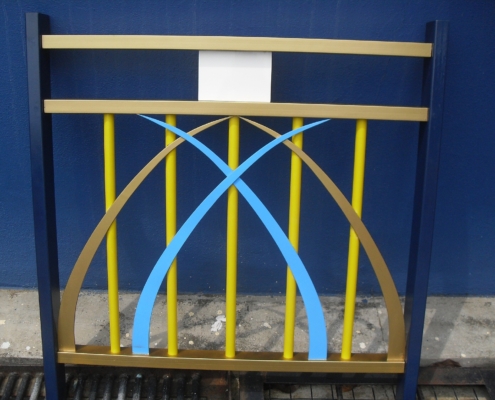
BUY PLATFORM AND HANDRAIL SYSTEMS HERE
Wrap-Up!
In conclusion, FRP platforms and handrail systems offer many benefits, making them a superior choice in various applications. Their innovative design, incorporating catwalk grating and fiberglass stair treads, ensures a robust and safe environment. Moreover, the lightweight nature of these systems translates to reduced installation costs and simplified logistics, underscoring their cost-effectiveness and appeal to a broad range of industries.

